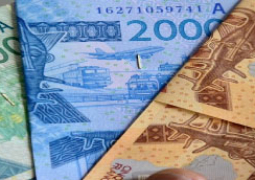The Vice-President and Minister of Women's Affairs last Wednesday inaugurated the newly constructed Independent Electoral Commission Headquarter (IEC), located along Bertil Harding Highway Kanifing Layout.
The official inauguration was attended by cabinet members, heads of government departments, the private sector, religious leaders, stakeholders in the electoral process, as well as international organisations.
In her opening statement, on behalf of the President, Vice-President Njie-Saidy said the facility is one among many that the IEC would be putting up, for which plans are being advanced.
"In the not-too-distant future, six regional IEC offices would be built in addition to the one that is already completed in
According to Madam Njie-Saidy, the government has over the years invested millions of Dalasi on public buildings and infrastructure. These, she added, include the very recent ones, such as the Gambia Revenue House, the Environment House, and now The Election House.
"Already works have started in earnest towards the construction of a new complex in
She noted that since its establishment in 1996, the IEC has successfully conducted two national presidential and parliamentary elections, in addition to other sub-national elections.
For his part, Alhaji Mustapha Carayol, the Chairman of the Independent Electoral Commission, said the establishment of an Independent Electoral Commission in The Gambia was a great leap forward. The conduct of elections, he added, was not a new phenomenon.
"Even in colonial times elections to a legislative council were conducted through restricted franchise. The first general election on universal adult suffrage was held in 1962, after much pressure for the independence of the colony by political activities," he stated. This type of set up, Carayol added, encouraged the perpetuation of official positions, as well as the expediency of ensuring that the President, on whom appointments depended, was re-elected into office.
According to him, the government of The Gambia has always provided the IEC with the needed resources to conduct its activities. "International assistance to the IEC in the conduct of elections came in many forms, such as expertise and materials,” he further stated.
Prior to the creation of the IEC, Mustapha Carayol noted that the government of The Gambia had reached an agreement with international agencies, such as the United Nations Development Programme (UNDP), European Union (EU) and the Department for Development Support and Management Services (DDSMS) on the formulation of an umbrella project to channel support to the electoral process.


